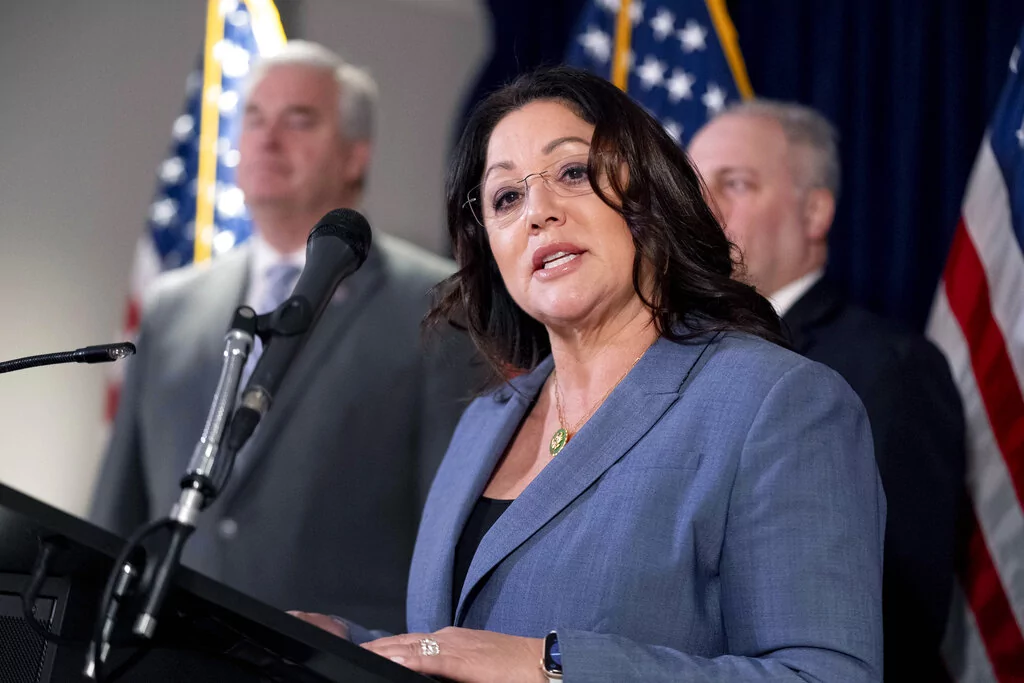

EXCLUSIVE — Rep. Lori Chavez-DeRemer (R-OR) is leading the latest House bill on in vitro fertilization procedures as abortion and women’s reproductive healthcare take center stage in the 2024 election.
Chavez-DeRemer, along with Reps. Zach Nunn (R-IA), Debbie Wasserman Schultz (D-FL), and Susan Wild (D-PA), introduced the Helping to Optimize Patients’ Experience, or HOPE with Fertility Services Act, on Wednesday. The bill would expand access to IVF by requiring private health insurance plans to cover infertility treatments, which would alleviate an “enormous financial burden for women,” according to the members.
“Every year, thousands of babies are born in the United States thanks to IVF,” Chavez-DeRemer said in a press release first shared with the Washington Examiner. “Unfortunately, there are many more couples out there struggling with infertility who want to have children but can’t afford the procedure.”
The Oregon congresswoman said she has been working on legislation that would gain bipartisan support to address the financial burden IVF can be.
“I’m proud to officially introduce the HOPE with Fertility Services Act, which will help more Americans start or grow their families and experience one of the greatest gifts and joys in life,” Chavez-DeRemer said. “As a proud mother of twin daughters, I’ll keep working across the aisle to improve health care access and affordability for women.”
Chavez-DeRemer’s bill comes after the Democratic Congressional Campaign Committee launched mobile billboards attacking the Oregon Republican and four other House GOP lawmakers for their reactions to the overturning of Roe v. Wade. In a statement, Chavez-DeRemer dismissed the DCCC’s ad campaign and said she has not been afraid to “stand up to members of my own party on these issues.”
Under Chavez-DeRemer’s legislation, three causes of infertility will be covered under private insurance plans: infertility due to a diagnosed disease or physical ailment that prevents the bringing of a child to full-term live birth; unexplained infertility, such as a couple who cannot conceive after trying for at least 12 consecutive months; and infertility or anticipated infertility due to a course of treatment for another ailment such as undergoing chemotherapy for cancer.
The HOPE with Fertility Services Act comes two days after the second anniversary of the overturning of Roe that occurred on June 24, 2022, rolling back federal abortion protections. Since then, Democrats have used the Dobbs v. Jackson Women’s Health Organization decision to target vulnerable Republicans and the GOP altogether as anti-women and anti-IVF.
Republicans, who are familiar with the Democrats’ anti-abortion remarks, found themselves with a political headache in February when the Alabama Supreme Court ruled frozen embryos were legally children and destroying them could constitute a crime.
Most GOP lawmakers at the state and national levels sought to distance themselves from the ruling, and the Alabama state legislature passed a law in March that would extend criminal and civil immunity to IVF clinics for operations. However, Democrats have latched onto the IVF decision as another manner in which the striking down of Roe is affecting more people than those who are anti-abortion.
The Alabama ruling still could deliver a severe blow to swing-seat members like Chavez-DeRemer, whose district is rated a “toss-up” in the November elections by the Cook Political Report.
Statistically, many GOP voters are supportive of IVF treatments, so seeing restrictions placed on the medical practice could cause consequential damage to independent and centrist Republican voters, making IVF a central issue for Republicans to message on heading into the 2024 election.
Several House Republicans such as Rep. Nancy Mace (R-SC) have introduced IVF-related resolutions, while Rep. Anna Paulina Luna (R-FL) put forward the first GOP-led legislation seeking to offer protections to those who undergo or perform the IVF procedure. Wild also has a bill titled the Access to Family Planning Act, which would “prohibit the limitation of access to assisted reproductive technology, and all medical care surrounding such technology.”
CLICK HERE TO READ MORE FROM THE WASHINGTON EXAMINER
The HOPE with Fertility Services Act has the support of groups like RESOLVE: The National Infertility Association and the American Society for Reproductive Medicine.
“In an era of political polarization, we are thrilled to see bi-partisan legislation to enhance access to fertility care,” Elizabeth Ginsburg, president-elect of the American Society for Reproductive Medicine, said in a statement. “We are grateful to Representatives Chavez-DeRemer, Nunn, Wild, and Wasserman Shultz for being able to find common ground on this important topic. We hope their example will inspire their colleagues to move this bill quickly to final passage.”





